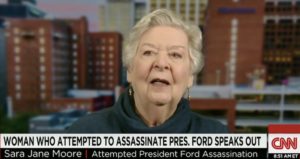What’s at Stake in Iowa
The Bhutto assassination came as a brutal reminder of the gravity of the decision Iowa's voters will make Thursday. Its impact may be felt most powerfully by Democrats who have been thinking less about issues than about the candidates' styles and leadership qualities.DES MOINES, Iowa — The assassination of Benazir Bhutto came as a brutal reminder of the gravity of the decision Iowa’s voters will be rendering in their caucuses next Thursday night. Its impact may be felt most powerfully by Democrats who have been thinking less about issues than about the style and quality of leadership they are seeking from their next president.
All of a sudden, the politicians’ endless loop of television advertisements took on a new and somber significance. During “Good Morning America’s” coverage of Bhutto’s murder, up popped a Hillary Clinton ad where the message over grave music is that the moment “demands a leader with a steady hand who will weather the storms.” No kidding.
A short while later, there is a Joe Biden commercial that looks as if it had been produced precisely for this moment. “We don’t have to imagine the crises the next president will face,” intones a very serious voice. Indeed not.
Clinton, of course, is hoping that the chaos in Pakistan will fortify her relentless arguments about the importance of experience. Biden’s refusal to back away from his insistence that this should be a foreign policy election seems shrewder now than it did last week. Indeed, Biden has been warning not for months but for years that the United States faces its gravest challenge in Pakistan.
The television pictures from Pakistan ratified that Biden was no Chicken Little. He noted on Thursday that he had “twice urged President Musharraf to provide better security for Ms. Bhutto and other political leaders.” Biden was suddenly relevant — to television bookers for sure, but also, perhaps, to voters.
David Axelrod, one of Barack Obama’s senior advisers, acknowledged that the events in Pakistan could well shake the campaign. But he insisted that they validated Obama’s original judgment that the war in Iraq was the wrong battle at the wrong moment. Obama, he said, would be happy to reopen the debate on “judgment” in foreign policy.
Still, Iowa’s Democrats work to their own rhythms. Foreign policy differences — indeed, almost all issue differences — have had very little to do with the battle here.
Instead, said Axelrod, the rhythm of this campaign has been defined by “three different approaches” to the presidency laid out by Clinton, John Edwards and his own candidate.
Clinton’s argument, he said, is that “she’s been around the block,” a not quite charitable way of characterizing Clinton’s claims that her experience readies her for the coming battles for change that all Democrats devoutly wish to wage.
“The Edwards campaign is ‘Storm the Bastille,’ ” said Axelrod, a colorful description of the former senator’s fierce attacks on drug companies, oil companies and all others who would stand in the way of reform. This is appealing to the many Democrats who are in a fighting mood.
But Obama is running as the candidate who can transcend the old fights. In offering his own closing argument at a Masonic hall here Thursday, he poked fun at Clinton’s recent embrace of change as her own magic word. No, said Obama, change “has been our message when we were down, and our message when we were up. And it must be catching on because … everyone is talking about change.”
Clearly but obliquely referring to Edwards, Obama preached that anger won’t cut it, either. “There’s no shortage of anger and bluster and bitter partisanship out there,” Obama said. “We can change the electoral math that’s been all about division and make it about addition.”
Thus has a wide Democratic consensus defined the choice here as among three different change agents: one tough and experienced, another forceful and angry, the third sunny and inspirational. Biden stands outside their fight, listening to his own drummer.
Democrats have been in this place before. Writing to his friend Newton Minnow about the 1960 nomination battle among John F. Kennedy, Lyndon Johnson and Adlai Stevenson, the veteran New Deal lawyer James Rowe wondered what all the commotion was about.
“As long as the available mechanism is the Democratic Party, and the troops to command are Democrats, I do not think there would be much difference between the three men,” Rowe wrote. “This is the reality and all the sound and fury of ‘liberalism’ and ‘moderation’ which all of your gentlemen indulge in are mere chimera.”
But in Iowa this late December, the differences among today’s three leading Democrats seem real enough, and all the more so now that the world has brutally forced its way into Iowans’ already agonized deliberations.
E.J. Dionne’s e-mail address is postchat(at)aol.com.
© 2007, Washington Post Writers Group
Your support matters…Independent journalism is under threat and overshadowed by heavily funded mainstream media.
You can help level the playing field. Become a member.
Your tax-deductible contribution keeps us digging beneath the headlines to give you thought-provoking, investigative reporting and analysis that unearths what's really happening- without compromise.
Give today to support our courageous, independent journalists.





You need to be a supporter to comment.
There are currently no responses to this article.
Be the first to respond.